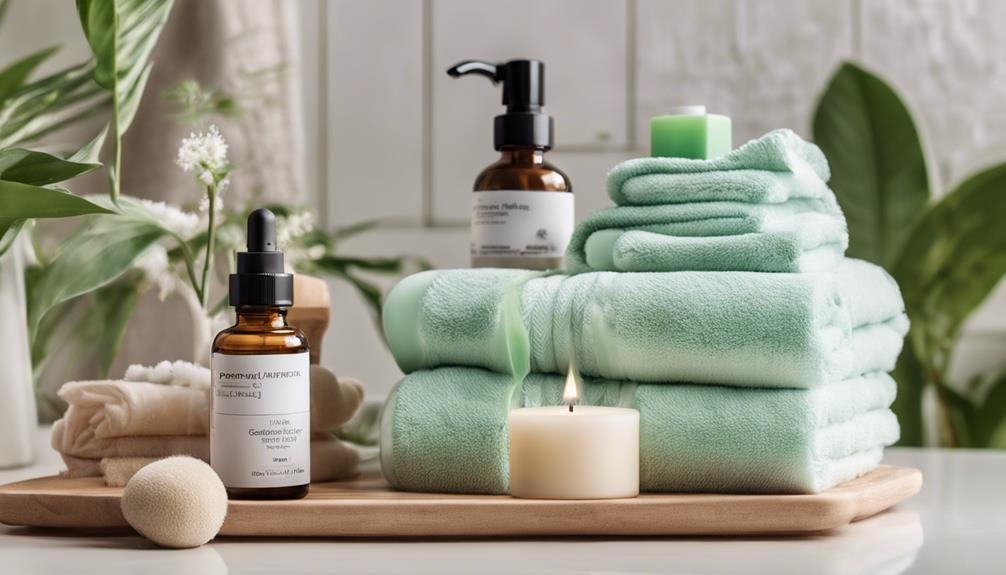When it comes to caring for sensitive skin, think of it as delicate glass in need of gentle handling to maintain its clarity and strength. But what if your skincare routine is inadvertently causing more harm than good? A few simple adjustments could be the key to bringing calm to your skin's sensitivity. By understanding the basics of skincare tailored to your skin's needs, you can start on the path to finding relief and comfort.
Key Takeaways
- Choose hypoallergenic, fragrance-free skincare.
- Use gentle, hydrating products with soothing ingredients.
- Avoid harsh chemicals, fragrances, and exfoliants.
- Practice stress management for skin health.
- Consult a dermatologist for personalized care.
Understanding Sensitive Skin
Sensitive skin is a condition that many individuals experience, characterized by heightened reactivity to external stimuli. This reactivity can manifest as redness, itching, burning sensations, or dryness. Several factors can contribute to sensitive skin, including genetics, environmental factors, and underlying skin conditions. Individuals with sensitive skin often find that certain products or ingredients trigger adverse reactions, leading to discomfort and irritation. It's essential to identify and avoid these triggers to maintain skin health and comfort.
Moreover, sensitive skin requires gentle care to prevent exacerbating symptoms. Opt for skincare products labeled as hypoallergenic, fragrance-free, and formulated for sensitive skin. When selecting products, look for ingredients like ceramides, hyaluronic acid, and niacinamide, known for their soothing and hydrating properties.
Additionally, avoid harsh exfoliants, alcohol-based products, and abrasive cleansing techniques that can irritate sensitive skin further. Understanding your skin's unique needs and triggers is crucial in managing sensitive skin effectively. By adopting a gentle skincare routine and avoiding potential irritants, you can help soothe and protect your sensitive skin.
Gentle Cleansing Techniques
To effectively cleanse sensitive skin without causing irritation, gentle cleansing techniques are paramount. When washing your face, opt for mild, fragrance-free cleansers that are specifically formulated for sensitive skin. Avoid harsh ingredients like alcohol, sulfates, and artificial fragrances, as these can strip the skin of its natural oils and lead to irritation.
When cleansing, use lukewarm water instead of hot water, as hot water can exacerbate sensitivity by causing redness and dryness.
During cleansing, be gentle and avoid scrubbing your skin vigorously. Instead, use light, circular motions with your fingertips to cleanse without causing friction. Pat your skin dry with a soft towel after washing, rather than rubbing it, to prevent further irritation.
It's also important to cleanse your skin only when necessary, typically in the morning and evening, to avoid over-cleansing, which can disrupt the skin's natural barrier.
Choosing Suitable Skincare Products
For effective skincare for sensitive skin, selecting suitable products is crucial. When choosing skincare products, consider the following:
- Look for Hypoallergenic Formulas: Opt for products labeled hypoallergenic as they're formulated to minimize the risk of allergic reactions, making them gentler on sensitive skin.
- Avoid Fragrances and Harsh Chemicals: Fragrances and certain chemicals can irritate sensitive skin. Choose products that are fragrance-free and free from harsh ingredients like sulfates and parabens.
- Check for Calming Ingredients: Ingredients like aloe vera, chamomile, and oat extract are known for their soothing properties. Products containing these ingredients can help calm and nourish sensitive skin.
- Opt for Simple Formulations: Products with fewer ingredients are less likely to cause irritation. Look for minimalist formulations that focus on gentle cleansing and hydration without unnecessary additives.
Importance of Patch Testing
Regularly conducting patch tests before incorporating new skincare products into your routine is a crucial step in maintaining healthy, sensitive skin.
Patch testing involves applying a small amount of the product onto a discreet area of your skin, such as the inner forearm, and monitoring for any adverse reactions over 24-48 hours.
This simple yet effective practice can help you identify potential irritants or allergens before they cause widespread skin issues. Sensitivity to certain ingredients varies among individuals, making patch testing an essential precautionary measure.
Even natural or hypoallergenic products can trigger reactions in sensitive skin types. By patch testing each new product, you can safeguard your skin from unnecessary irritation, redness, itching, or inflammation.
Soothing Ingredients to Look For
When seeking skincare products to soothe sensitive skin, look for key ingredients known for their calming and gentle properties. Incorporating these soothing ingredients can help reduce redness, irritation, and inflammation, providing relief and comfort to your delicate skin.
Here are some ingredients to look for in skincare products:
- Aloe Vera: Known for its hydrating and soothing properties, aloe vera helps calm and moisturize sensitive skin.
- Oatmeal: With anti-inflammatory properties, oatmeal can help soothe and protect sensitive skin, making it an excellent choice for those prone to irritation.
- Chamomile: This gentle ingredient has anti-inflammatory and antioxidant properties, making it ideal for calming sensitive and reactive skin.
- Hyaluronic Acid: While not directly soothing, hyaluronic acid is a hydrating ingredient that can help maintain the skin's moisture barrier, essential for sensitive skin health.
Avoiding Common Irritants
Exploring skincare products with soothing ingredients is a great start, but equally important is being mindful of common irritants that can trigger sensitivity in your skin. To avoid exacerbating your skin sensitivity, steer clear of products containing fragrances, alcohol, and harsh preservatives.
Fragrances, whether synthetic or natural, can be irritating to sensitive skin types. Alcohol, often found in toners and astringents, can strip the skin of its natural oils, leading to dryness and irritation. Additionally, preservatives like parabens and formaldehyde-releasing agents can cause allergic reactions in sensitive individuals.
Opt for fragrance-free and alcohol-free products labeled as suitable for sensitive skin. When choosing skincare products, always check the ingredient list and look for gentle, non-irritating options. By avoiding these common irritants, you can help prevent flare-ups and maintain a calmer, more balanced complexion.
Hydration and Moisturization Tips
To maintain healthy and hydrated skin, prioritizing proper hydration and moisturization is essential. Here are some tips to help you keep your skin nourished and glowing:
- Drink Plenty of Water: Hydrate your skin from within by drinking an adequate amount of water daily. Aim for at least 8 glasses to keep your skin hydrated and supple.
- Use a Gentle Cleanser: Opt for a mild, fragrance-free cleanser to avoid stripping your skin of its natural oils. Look for products with hydrating ingredients like hyaluronic acid or glycerin.
- Moisturize Regularly: After cleansing, apply a moisturizer suited for sensitive skin. Choose a product that's free from irritants like fragrances and dyes, and contains ingredients like ceramides or shea butter to lock in moisture.
- Consider a Humidifier: If you live in a dry climate or during colder months, using a humidifier can help add moisture to the air, preventing your skin from drying out.
Sun Protection for Sensitive Skin
For individuals with sensitive skin, safeguarding against sun damage is crucial to prevent irritation and potential skin issues. When it comes to sun protection, opt for a broad-spectrum sunscreen with an SPF of 30 or higher. Look for physical blockers like zinc oxide or titanium dioxide, as they're less likely to cause irritation than chemical sunscreens. Apply sunscreen generously and reapply every two hours or after swimming or sweating.
Aside from sunscreen, consider wearing protective clothing, hats, and sunglasses to shield your skin from harmful UV rays. Seek shade during peak sun hours, typically between 10 a.m. and 4 p.m., to reduce sun exposure. Remember that sensitive skin can react strongly to the sun, leading to redness, rashes, or sunburn.
Being proactive about sun protection is key to maintaining skin health and preventing flare-ups. By taking these precautions, you can enjoy the outdoors while keeping your sensitive skin safe and comfortable.
Managing Stress and Its Impact
As you focus on maintaining your skin's well-being, it's important to acknowledge the significant impact that stress can have on your skin's condition. Stress can trigger inflammation and exacerbate skin conditions like eczema and acne, making it essential to manage stress effectively. Here are some evidence-based strategies to help you combat stress and support your skin health:
- Practice Mindfulness: Engage in activities like meditation or deep breathing exercises to reduce stress levels and promote skin healing.
- Get Adequate Sleep: Prioritize quality sleep to allow your skin to repair and regenerate, combating the effects of stress.
- Regular Exercise: Physical activity releases endorphins that help reduce stress and improve blood flow to the skin for a healthy glow.
- Healthy Diet: Consuming a balanced diet rich in antioxidants, vitamins, and minerals can support your skin's resilience to stress-related damage.
Incorporating Gentle Exfoliation
In your skincare routine, incorporating gentle exfoliation can play a crucial role in maintaining a healthy and radiant complexion. Exfoliation helps remove dead skin cells that can clog pores, leading to dullness and breakouts.
For sensitive skin, it's essential to choose exfoliants with non-abrasive particles like jojoba beads or chemical exfoliants containing alpha hydroxy acids (AHAs) or beta hydroxy acids (BHAs). These ingredients can gently slough off dead skin cells without causing irritation.
When incorporating exfoliation into your routine, remember to do it no more than 1-2 times a week to avoid over-exfoliation, which can damage the skin's barrier. After exfoliating, follow up with a hydrating and soothing moisturizer to replenish the skin's moisture barrier. Be gentle during the exfoliation process, avoiding harsh scrubbing motions that can aggravate sensitive skin.
Lifestyle Changes for Skin Health
To promote optimal skin health, making lifestyle changes can greatly impact the overall condition of your skin. Here are some simple adjustments you can make to support your skin health:
- Stay Hydrated: Drinking an adequate amount of water helps keep your skin hydrated from the inside out, promoting a healthy glow and maintaining skin elasticity.
- Eat a Balanced Diet: Consuming a variety of fruits, vegetables, lean proteins, and healthy fats provides essential nutrients like vitamins A, C, and E, which are beneficial for skin health.
- Get Sufficient Sleep: Aim for 7-9 hours of quality sleep each night to allow your skin to repair and regenerate. Lack of sleep can lead to dull skin and exacerbate sensitivity.
- Manage Stress: Chronic stress can trigger skin issues like acne and eczema. Practice stress-reducing activities such as yoga, meditation, or deep breathing exercises to support your skin's health.
Consulting a Dermatologist
Considering the intricacies of skin health and the unique needs of your skin, consulting a dermatologist can prove to be a pivotal step towards addressing any concerns or conditions effectively. Dermatologists are medical experts specialized in diagnosing and treating various skin issues, including sensitive skin. By seeking their professional guidance, you can receive personalized recommendations tailored to your skin type and concerns.
During a dermatology consultation, the dermatologist will assess your skin's condition, discuss your concerns, and provide expert advice on suitable skincare products and routines. They can also offer treatments or prescribe medications to manage sensitive skin symptoms like redness, itching, or dryness.
Moreover, dermatologists can help identify underlying causes of skin sensitivity, such as allergies, eczema, or rosacea, and develop a comprehensive treatment plan to address these issues effectively.
In some cases, they may recommend allergy tests or further investigations to pinpoint triggers for your skin sensitivity.
Frequently Asked Questions
Can Stress Worsen Sensitive Skin Conditions?
Stress can indeed exacerbate sensitive skin conditions. Emotional strain triggers inflammatory responses that may lead to flare-ups. Practicing stress-reducing activities like meditation and deep breathing can help alleviate these effects, promoting skin health.
How Often Should I Change My Pillowcase for Sensitive Skin?
You should change your pillowcase every 2-3 days for sensitive skin. Regular changes help reduce contact with dirt, oils, and allergens that can irritate your skin. Fresh pillowcases promote a cleaner sleep environment and healthier skin.
Is There a Link Between Diet and Sensitive Skin?
Eating habits can impact sensitive skin. High-sugar foods may trigger inflammation, worsening skin sensitivity. Consuming antioxidant-rich fruits and veggies can help combat free radicals that contribute to skin issues. Stay hydrated and maintain a balanced diet for healthier skin.
Can Pets Aggravate Sensitive Skin Reactions?
Pets can aggravate sensitive skin reactions due to dander, saliva, or urine. Regular grooming, vacuuming, and washing pet bedding can help reduce irritants. Consult a dermatologist for personalized advice on managing skin sensitivity while enjoying your furry companions.
What Impact Can Pollution Have on Sensitive Skin?
Pollution can exacerbate sensitive skin issues by clogging pores, causing inflammation, and accelerating skin aging. Protect your skin by cleansing regularly, using a barrier cream, and seeking antioxidants like vitamin C to combat environmental damage.
Conclusion
In conclusion, by taking gentle care of your skin and choosing suitable products, you can effectively manage sensitivity. Remember to listen to your skin's needs and prioritize its health. Embrace a soothing skincare routine, and you'll be on your way to a calmer complexion. Always remember, your skin deserves the best care possible.







